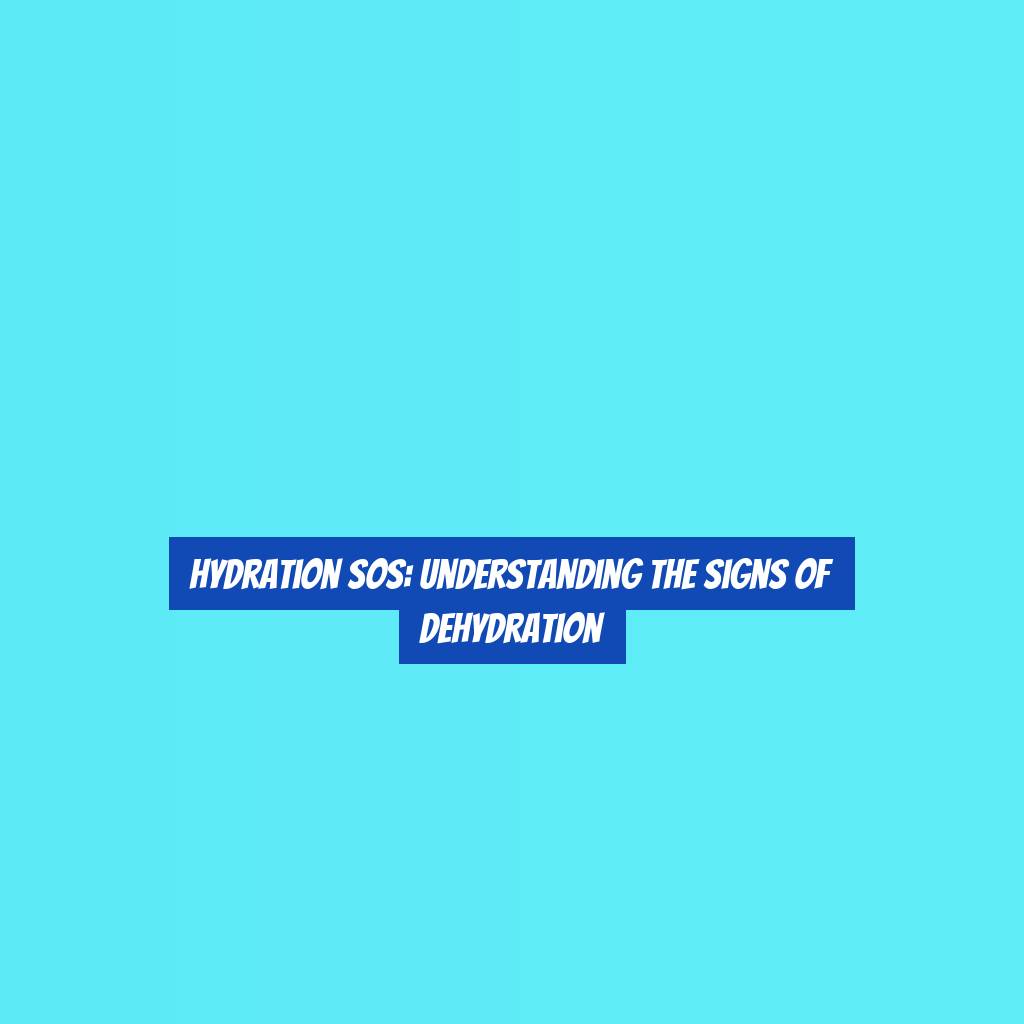Hydration SOS: Understanding the Signs of Dehydration
YouG??re out for a run on a hot day, and despite feeling thirsty, you decide to push through without taking a water break. As you continue, you start to feel light-headed and fatigued, and your performance begins to suffer.
But these physical symptoms are just the tip of the iceberg when it comes to dehydration. Understanding the signs of dehydration goes beyond just feeling thirsty, and recognizing these signs early can be crucial for your health and well-being.
So, what are the other signs you should be aware of?
Importance of Hydration
Staying hydrated is crucial for maintaining optimal bodily functions and overall health. Your body is made up of about 60% water, and every system depends on it to function properly. Water helps regulate body temperature, aids in digestion, and flushes out waste and toxins. When youG??re dehydrated, your body canG??t perform these functions as effectively, leading to a range of issues such as fatigue, dizziness, and headaches.
In addition, staying hydrated is essential for maintaining healthy skin, as water helps to keep it moist, elastic, and glowing.
Moreover, proper hydration is especially important if you engage in physical activity. When you exercise, your body loses water through sweat, which needs to be replenished to prevent dehydration. Dehydration can lead to decreased athletic performance, muscle cramps, and even heat-related illnesses. By drinking enough water before, during, and after exercise, you can help your body maintain its performance and recovery.
Early Signs of Dehydration
Feeling thirsty is often an early sign of dehydration, indicating that your body needs more water. Other early signs can include dry mouth, dark yellow urine, and a decrease in urine output. You might also notice that you feel fatigued or sluggish, as dehydration can lead to a drop in energy levels. Headaches and dizziness are common early indicators as well.
Your body may try to conserve water by producing less sweat, which can lead to an increase in body temperature. Additionally, experiencing dry skin, especially on your lips and in the mouth, can be a sign that you need to up your water intake. Furthermore, if you find yourself feeling more irritable or having difficulty focusing, it could be due to mild dehydration.
Paying attention to these early signs and addressing them promptly by drinking water or consuming hydrating foods can help prevent more severe dehydration and its associated complications. Remember to listen to your body and provide it with the hydration it needs to function at its best.
Impact on Physical Performance
Maintaining proper hydration levels significantly affects your physical performance during activities and exercise. Dehydration can lead to decreased endurance, strength, and overall athletic performance.
When your body lacks adequate fluid, it can result in decreased blood volume, which in turn reduces the amount of oxygen and nutrients delivered to your muscles. This hinders your musclesG?? ability to produce energy and perform optimally, leading to premature fatigue and reduced stamina.
Additionally, dehydration impairs your bodyG??s ability to regulate temperature, making you more susceptible to heat-related illnesses such as heat exhaustion or heat stroke during intense physical exertion. It also diminishes coordination and balance, increasing the risk of injuries during activities.
Furthermore, dehydration can lead to muscle cramps, which can significantly impair your ability to maintain peak performance. Therefore, itG??s crucial to prioritize hydration before, during, and after physical activities to ensure that your body can perform at its best and reduce the risk of dehydration-related performance issues.
Cognitive Effects of Dehydration
Dehydration can impair your cognitive function, affecting your ability to focus and make decisions efficiently. When youG??re dehydrated, your brain tissue loses water, causing it to shrink and pull away from the skull. This can lead to headaches and difficulty concentrating, making it harder to stay attentive and alert throughout the day.
Additionally, dehydration can hamper your short-term memory, making it challenging to retain and recall information when needed.
Cognitive Effects of Dehydration
-
Reduced Mental Clarity: Dehydration can cloud your thinking and hinder your ability to process information quickly and accurately.
-
Impaired Decision-Making: When dehydrated, your brain struggles to weigh options and make sound judgments, potentially leading to poor decision-making.
-
Diminished Cognitive Performance: Dehydration can slow down your cognitive processing speed, impacting your overall mental performance and productivity.
ItG??s crucial to stay hydrated to maintain optimal cognitive function. Remember to drink plenty of water throughout the day to keep your brain sharp and functioning at its best.
Hydration Strategies
To maintain optimal hydration levels, itG??s important to consistently drink water throughout the day and pay attention to your bodyG??s signals for thirst. Start your day with a glass of water and keep a water bottle with you to sip on throughout the day.
Aim to drink at least 8-10 cups of water daily, and adjust based on your activity level, climate, and individual needs. Incorporating water-rich foods like fruits and vegetables into your diet can also contribute to your overall hydration. Additionally, be mindful of diuretic beverages like alcohol and caffeinated drinks, which can increase fluid loss.
If you struggle to drink enough water, try setting reminders on your phone or using a water tracking app to monitor your intake. Experiment with different temperature preferences or infuse your water with fruits for added flavor.
ItG??s essential to recognize the signs of dehydration and act promptly by increasing your fluid intake. Understanding your own hydration needs and developing a strategy that works for you can help ensure that you stay properly hydrated throughout the day.
Conclusion
So, next time youG??re feeling thirsty, donG??t ignore it. Recognize the signs of dehydration early and take action to stay hydrated.
Your physical performance and cognitive function depend on it. Keep a water bottle handy and sip throughout the day, especially during physical activity.
Your body will thank you for it!





